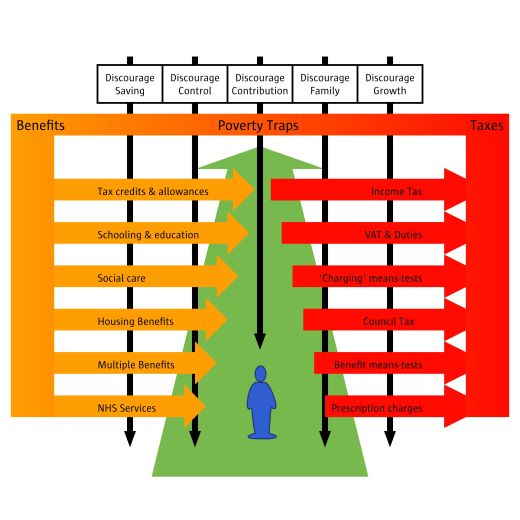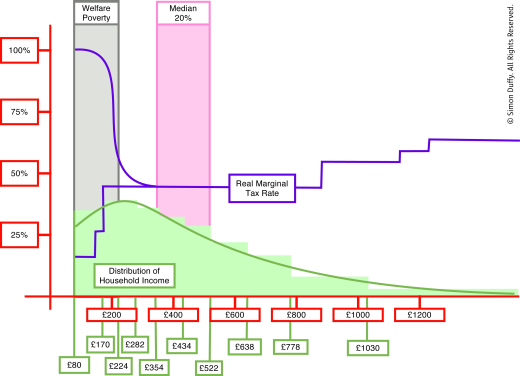The debate about conditionality in work and the benefits system is confusing and this does not help us build systems that encourage work and contribution.
Author: Simon Duffy
This short paper is based on a presentation given at a DEMOS/A4E Fringe Event at the 2009 Labour Party Conference.
In the early 1990’s during the John Major recession I helped set up an agency to support people with severe physical and intellectual disabilities into work. One thing that struck me then was that we never had any significant trouble finding real paid work for disabled people - even though we were working in one of the poorest parts of London. Instead the two main obstacles to success were that: people feared that they would lose their security of income and housing from working, or people really did lose that security.
The reason that there are two obstacles here is that the benefit system was (and is) so complicated that hardly anyone could be certain as to whether they would lose out if they started work. Moreover every new system or change which was brought in to try and ameliorate the extremes of this poverty trap added to the poverty trap by creating more complexity - this complexity tends to leave people either more anxious or more cynical.

These obstacles seemed like big problems to us then because work is not just a way of earning money - it is one of the most powerful ways of expressing and strengthening our active citizenship. As Beveridge himself said “idleness is not the same as want, but a separate evil which men do not escape by having an income. Idleness, even on income, corrupts. The feeling of not being wanted demoralises.” With work comes money, friendship, contribution, support and a stronger sense of personal worth. It seems hard to believe that the current benefit regime helps people make the best use of their diverse talents. Rather, we tax the poor into a state of passivity.
As a Harkness Fellow in the mid 1990’s I began to examine the nature of the welfare state and, of course, came upon the long-standing debate on the feasibility of a minimum income guarantee - how to provide people with income security and a strong incentive to work. The practical difficulty is that you cannot achieve both income security and lower taxation for the poor without increasing the level of marginal tax rate for middle earners.
What is interesting about this challenge is that it is not economically difficult; a modest increase in marginal tax rates for middle earners - a group who are particularly unlikely to be significantly disincentivised by such an increase in the marginal rate of taxation - would pay for a significant drop in marginal tax rates for the poor. Moreover the likely long-term economic impact of such a shift seems to be very positive. It would probably lead to increased productivity and the ability to reduce the average level of taxation for all.
The obstacle to this shift is not economic it is political. It is a side-effect of what John Stuart Mill called the “Tyranny of the Majority”. In a welfare state - where the state controls nearly 40% of GDP - and controls a tax-benefit system that underpins income security for all - it is not surprising that politicians have to pay the most attention to middle earners. It is also not surprising that the lowest marginal tax rates are for middle earners.
In other words (if one looks at marginal tax rates) it is the poor and the rich who pay the most tax. It is the swing voter that pays the least tax:

We can also see the same effect in other areas of the welfare state. For example, everybody is seen as needing health care - so we spend 10% of GDP on a universal non-means-tested system. Social care is seen as a minority interest, for the relatively few people with significant disabilities and for the unlucky older person at the end of their life - so we spend 2% of our GDP on a heavily means-tested system. There is no ethical or economic reason for this disparity - but it is well explained by the Tyranny of the Majority hypothesis.
No post-war government has been able to radically re-design the tax-benefit offer. Instead we have seen some more limited, but interesting innovations in the benefit system. In particular we have seen some success in supporting people back into work by the encouragement of a more diverse and innovative support systems through the engagement of organisations from civil society. This approach is to be welcomed - not only because it leads to more innovation but also because it brings more scrutiny to the underlying problems. This brings us to the latest reform effort:
Conditionality - in this context - means the use of negative incentives to encourage a return to work: for example, you will lose your Job Seekers Allowance if you do not co-operate. Negative incentives seem much easier (politically and economically) to build into the welfare system than positive incentives. After all the negative consequences are only faced by some of the poor themselves - those who end up even poorer than they are currently because they failed to meet whatever standard for compliance the system sets. If this approach really works it may be justifiable as a necessary evil - and certainly getting people into work is worth taking some risks to achieve. But have we really tried other alternatives? And what will happen to all those people who will seek security by trying even harder to show they cannot work?
This is also a good time to think a little bit harder about the concept of conditionality and its relationship to our rights and responsibilities. In the political discourse about benefits it has become convenient to talk about conditionality in two slightly contradictory ways:
It is worth unpicking these two forms of conditionality in some detail because in contemporary political rhetoric there is often a temptation to run these two different ideas together. This will lead to moral confusion and poor policy-making.
There is a kind of conditionality - or give and take - which is critical to the existence of our rights: rights must be matched by duties. I cannot have a right (negative or positive) without imposing a duty on someone else. But this does not mean that my rights must be matched by my duties. Different people need different things at different times - different people can contribute in different ways. And some rights are so fundamental that they must not be lost by any failure to fulfil some set of duties.
We don’t think the the rights of the child are conditional upon their fulfilling parental duties (or any other kind of duty). Nor can we surely think that the right to a minimum income is conditional upon our demonstrating a willingness to work. No matter how resistant someone may be to work then (in normal circumstances) we would still feel that the individual has a right to some minimum level of income support.
It may be that we want to claim that someone’s rights have been inflated or that someone’s duties are insufficiently large. It may be that we think the social balance of actual entitlements or the burden of responsibilities (say how the tax-benefit system works) is unfair or unbalanced. This can certainly be that case (in fact my argument above is that the burdens placed on the poor are too great - the responsibilities on the middle earners are too low). But getting the balance right is not resolved by demanding ‘greater conditionality’ - this is a confusion.
If our right to JSA is properly conditional it cannot be because our right to income security is optional. Income security is an absolutely fundamental right. If we are to treat JSA as conditional it must be because we don’t think people need it for their income - it must instead only be an extra allowance for job seeking (although I wonder if that is what we really think.)
There are other ways - more positive ways - of deploying conditionality.
For instance when we invented individual budgets at the end of the 1990s we developed a different and more positive approach. Individual budgets are often confused with direct payments (which are cash payments to disabled person). Instead an individual budgets work by first:
In other words Individual Budgets are Conditional Resource Entitlements. Note however an important distinction between how this system uses conditionality - it is not the entitlement itself which is conditional. No one loses their budget because they fail to meet their needs effectively - instead what changes is who is in control of that budget. Control is determined on the basis of who is most likely to make good decisions - this is almost always (but not always) the person themselves or their family or friends.
Conditionality is here a tool for making sure that the available money is really used to achieve the intended outcome.
What we have consistently learnt by the use of individual budgets is that the old system systematically underestimates the ability of individuals (the poorest and the most disabled) to improve their own circumstances themselves. It suggests that the current welfare system is deeply paternalistic. Given half a chance, and some positive incentives, people themselves quickly out perform the system - making better decisions, improving outcomes and using resources more efficiently.
It would be interesting to try applying some of these more positive methodologies to the reform of ‘back to work’ strategies. Even in the context of the current dysfunctional benefit system.
So some quick ideas on how can we change this system:
The publisher is The Centre for Welfare Reform.
Conditions to Work © Simon Duffy 2010.
All Rights Reserved. No part of this paper may be reproduced in any form without permission from the publisher except for the quotation of brief passages in reviews.
local government, nature & economics, politics, tax and benefits, Article